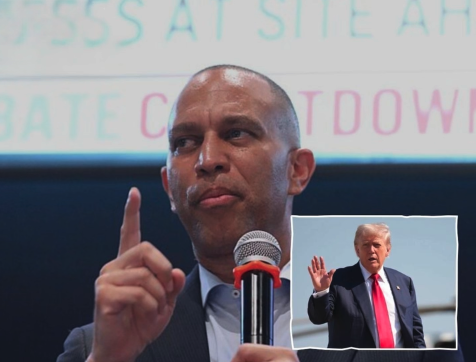House Minority Leader Hakeem Jeffries is facing criticism after signaling a potential investigation into private donors supporting former President Donald Trump’s White House ballroom project, raising concerns about the boundaries between political oversight and intimidation.
In the aftermath of the 2024 elections, Democrats have faced scrutiny for what critics describe as an aggressive legal strategy targeting Trump and his allies. Since leaving office in 2021, Trump has been the subject of a series of investigations, indictments, and court proceedings led in part by Democratic officials, including New York Attorney General Letitia James, whose efforts to challenge Trump’s business practices became a central element of her political career. Observers note the irony of James now facing her own legal challenges, including allegations of mortgage fraud, while the party she represents decries perceived “weaponization” of the justice system.
Against this backdrop, Jeffries’ announcement has raised eyebrows. The House Minority Leader suggested that federal and congressional oversight could extend to individuals who donated to Trump’s privately funded White House ballroom renovation—a move that critics say risks targeting ordinary citizens for their political contributions.
Political analysts warn that this could set a dangerous precedent, blurring the line between legitimate oversight and punitive action against political opponents. The development underscores ongoing tensions in Washington, where questions of legal authority, partisanship, and free political expression collide in the post-Trump era.
Hakeem Jeffries issues a “warning” to funders of the White House ballroom:
“These people are going to be held accountable, no matter how long it takes.”
They continue to threaten revenge on one hand, while hyperventilating about Trump’s “revenge tour” on the other. pic.twitter.com/lt0iGOBL7s
— Western Lensman (@WesternLensman) October 23, 2025
House Minority Leader Hakeem Jeffries escalated his criticism of former President Trump’s White House ballroom project this week, asserting—without presenting any evidence—that donors to the initiative were attempting to “curry favor” with the administration. In remarks on MSNBC, Jeffries framed the donations as part of a larger scheme, claiming, “More likely, this is part of what Donald Trump has been doing since day one of his presidency: running the largest pay-to-play scheme in the history of the country. And probably soliciting donations from people who’ve got business before the United States government.”
Jeffries further insisted that the contributions would be investigated thoroughly, stating, “All of this will have to be uncovered. It will. And these people are going to be held accountable, no matter how long it takes. And that’s a warning to all of these people participating in this scheming to manipulate taxpayer dollars and, of course, to destroy the people’s house. The White House belongs to the American people. It doesn’t belong to Donald Trump.”
Critics argue that Jeffries’ remarks effectively threaten private citizens for engaging in lawful political contributions, including to a project that will permanently enhance the East Wing of the White House. Observers note that 75 million Americans voted for Trump, making the building their institution as well. Historical precedent shows that every president has made renovations and additions to the White House, and Trump’s proposed ballroom is intended to serve future administrations rather than personal enrichment.
Analysts contend that the debate over the ballroom is less about policy or ethics and more about political theater. With Democratic policy initiatives facing criticism and high-profile scandals continuing to dominate headlines, attacks like Jeffries’ provide a way to maintain media attention and energize the party’s base. In this context, the criticism of the ballroom underscores a broader strategy in which opposition messaging replaces substantive debate, turning public discourse into a platform for partisan confrontation rather than policy discussion.

